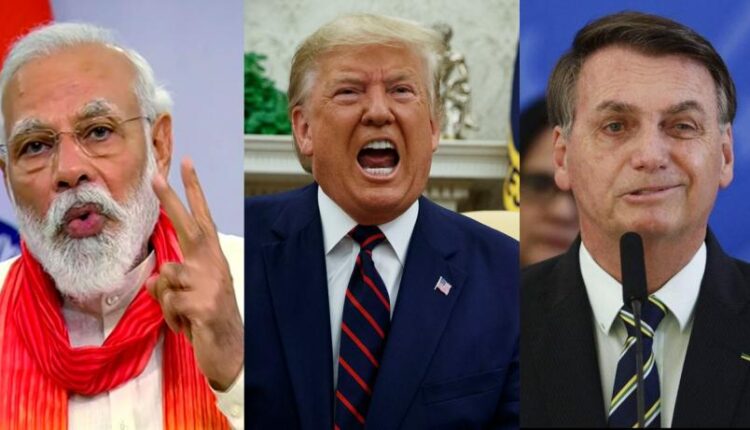
Tragic triangle
Covid 19 has ravaged the whole world but when all is said and done three countries are likely to have suffered the worst toll from the pandemic: United States, Brazil, and India.
Under the disastrous, delusional presidency of Donald Trump, the United States took the early lead in the grim race toward mass death. The administration said and did almost everything that an enemy power waging biological warfare against another nation would do to facilitate the spread of the virus—conceal and minimize the danger until it is too late, impede implementation of emergency policies to control the spread, sow confusion and disunity among the targeted population.
The biological warfare campaign was successful. The number of excess deaths in the country in 2020, compared to 2019, was greater than the excess deaths during the influenza pandemic of 1918, the misnamed “Spanish flu.”
The most tragic element of the American Covid 19 experience is that it was so unnecessary. The United States had the material and human resources to have done a markedly better job. That is the case even though, for a generation and thanks to the Republican “philosophy” of minimal government, this country has been unilaterally disarming for a war against something just like Covid 19. That has involved disinvestment in public health and a patchwork health care system based on profit, needless complexity, and limitations and inequalities in access.
In 2021 two things have led to a drop in cases and deaths: a new administration that instituted coordinated, rational policies based on science instead of fantasy; and vaccine development begun under the Trump administration — their one serious initiative against Covid 19 that finally bore fruit.
The rollout of the vaccine, under the Biden administration, undoubtedly has been more organized and comprehensive than it would have been under Trump. But the bulk of the damage was done by and during the Trump administration and is as irreversible as death, although the anti-vaccination movement that emerged more than a decade ago, and took a more partisan cast after Trump, remains an obstacle as we approach the final leg in the race against Covid 19.
The damage done by and during the Trump administration was severe, longstanding, and broad. The future looks better now in this country, but India and Brazil currently are taking a savage pounding from the virus. The United States, Brazil and India are vastly different countries, but they had one critical similarity when the virus struck: terrible, authoritarian leaders who gave more priority to the economy, to political rallies, to religious celebrations, and to stirring up ethnic hatred than to saving lives.
Indian Prime Minister Modi’s Hindu nationalism, a betrayal of the unitary vision of the founders of modern India, has exacerbated already sharp divisions in an exceedingly diverse country. Like in the United States, such divisions distract from and get in the way of the national effort required to face an adversary as dangerous as Covid 19. And in India, too, fierce political campaigns lead parties to convene mass rallies that devolve into super-spreader events.
The scenes of horror coming out of India today are out of Dante’s Inferno. Mass public incinerations of corpses. Hospitals that have run out of oxygen and patients’ families desperately searching for it. Although the Indian government, which has been growing increasingly authoritarian, has restricted social media coverage of these horrific images, they have run on network television all over the world. Can anybody in the United States continue to believe that Covid 19 is a hoax after India?
As for Brazil, Jairo Bolsonaro may be the worst elected president in the world now that Trump is gone. Like Trump, Bolsonaro scoffed at the danger of Covid 19 and did little to fight it. He fired public health officials and attacked state governors who did. He himself caught Covid-19 and then boasted about how easily he had gotten over it and doubled down on his policy of giving priority to the economy over lives. He lost on both counts. Deaths are rising fast, and the economy is sinking. There is widespread hunger, and Bolsonaro’s popularity has been diminishing.
Trump lost the election last year largely because of his Covid-19 disaster. Bolsonaro is likely to fare the same way next year when the Brazilian election takes place.
One lesson from this triangle of tragedies is that nationalistic leaders who care nothing about the welfare of other countries and the globe, who cry my country first, who spur on the burning of the Amazon (Brazil’s Bolsonaro) and of fossil fuels (Trump), and who encourage group hatreds (all three) are the worst possible leaders in a global pandemic. Leadership with a global vision and universal empathy is needed to fight a global pandemic in which no person or country is an island, and no one is safe until everyone is.

